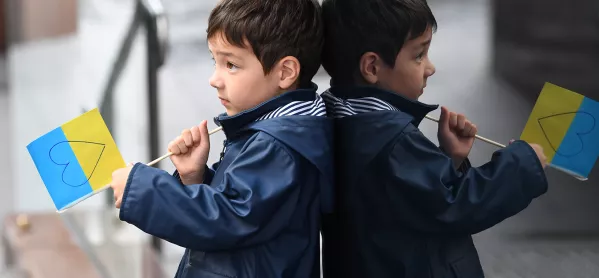Exclusive: Fund private school places for Ukrainians, DfE told

The government has been urged to get independent schools “more involved” with offering places to pupils fleeing the Russian invasion, and consider funding them to provide more places, as new data shows that more than one in 10 have not yet enrolled.
Data released today shows that just under 10,000 Ukrainian children who have come to the UK since the start of the Russian invasion have been offered places in the English schooling system.
More than one in 10 (1,500) applicants have not been offered places, but the Department for Education suggests the real figure of those not in schooling is much higher because it says a “sizeable” number have not applied.
- Feature: How educators around the world are supporting Ukrainian students
- Related: Schools ‘stand ready’ to take in fleeing Ukrainian children
- Background: How to talk to pupils about Ukraine, according to a child psychologist
Eleanora Suhoviy, an education consultant who moved to the UK from Ukraine at the age of 13, has suggested that getting more children into private schools may be the answer, as state schools may not always have the space.
Concern has previously been raised about the capacity of schools to take on Ukrainian children.
Plea for more support to get Ukrainian children into UK schools
The Local Government Association said in April that councils had “concerns” about “what happens if children arrive in an area and schools are already at capacity, or schools are unwilling to take children”.
The organisation added that “there may be situations where schools cannot physically, or in staff terms, accommodate new children”.
Speaking to Tes today, Ms Suhoviy, who works advising international families on independent school and university admissions, and founded the Oxford University Ukrainian Society, said that awareness of the need for schooling among Ukrainian communities “needed to be raised”.
Children in Ukraine start school at age 7, so many families now in the UK are not aware of the younger starting age here, she said.
She also said that many families, particularly of older children, were continuing with digital schooling offered in Ukraine, adding: “I hear that some families are hoping to head back soon, maybe as soon as September, so they are preferring to continue with the type of schooling before, which they can get online.”
Speaking about private schools, Ms Suhoviy said the government should look to get them “more involved” in the process of taking on Ukrainian children, adding: “They could pay or fund them to take on students. Some private schools have been doing this already, but funding this out of their own pockets.
“State schools may not have the capacity or space, so independent schools might be the answer.”
The DfE said that it wouldn’t rule this out as a solution if the issue arose in certain areas, but that up to this point, the capacity for school places had not been breached.
It’s not known how many Ukrainian refugees are currently being schooled in independent settings. The Headmasters’ and Headmistresses’ Conference, an association of over 300 independent schools, said that there are over 100 in its schools, with more expected to start in September.
Education secretary Nadhim Zahawi praised the “Herculean effort” of schools and local authorities in offering 9,900 places to Ukrainian refugees since the start of the crisis earlier this year, but also said the data showed how the country could “do better”.
He had previously suggested that the UK was ready to take on 100,000 children fleeing from the war.
Union leaders said schools are doing “everything possible” to accommodate and support refugee children.
Julie McCulloch, director of policy at the Association of School and College Leaders, said: “With regards to the ongoing and appalling war in Ukraine, the education community is doing everything possible to accommodate and support refugee children as quickly and effectively as possible.
“We are concerned, however, about the availability of wider specialist support for their mental health and wellbeing which schools can draw upon. Our impression is that this is patchy and that schools are largely doing this on their own without any additional resources.”
You need a Tes subscription to read this article
Subscribe now to read this article and get other subscriber-only content:
- Unlimited access to all Tes magazine content
- Exclusive subscriber-only stories
- Award-winning email newsletters
Already a subscriber? Log in
You need a subscription to read this article
Subscribe now to read this article and get other subscriber-only content, including:
- Unlimited access to all Tes magazine content
- Exclusive subscriber-only stories
- Award-winning email newsletters
topics in this article



